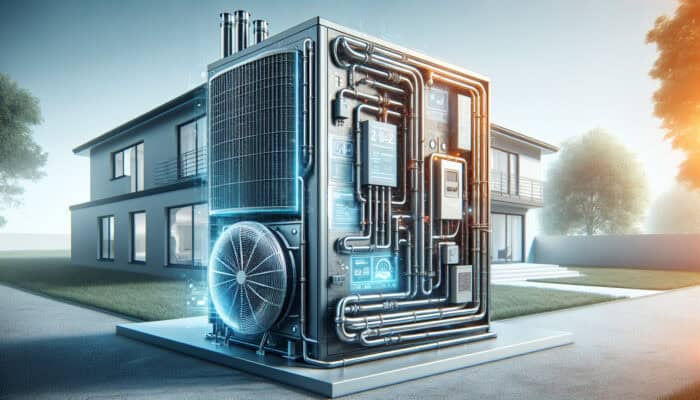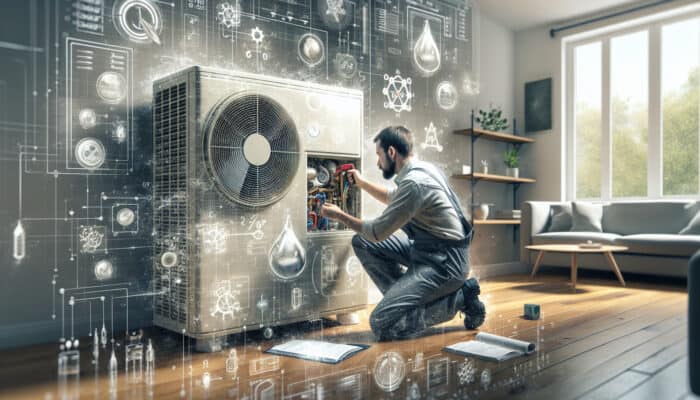Comprehensive Guide to Heat Pump Services Available in Ladner, Delta
Understanding Heat Pumps: Mechanisms and Operational Efficiency

Heat pumps represent a revolutionary approach to energy efficiency, serving as versatile systems that facilitate the transfer of heat between two environments. These sophisticated devices are adept at providing exceptional heating and cooling solutions for both residential and commercial properties. By leveraging the principles of thermodynamics, heat pumps can extract warmth from various sources, including air, ground, or water. During cooler seasons, they efficiently transfer heat indoors, while in warmer months, they expel heat outdoors. The benefits of utilizing heat pumps are numerous and impactful:
- Energy Efficiency: These systems consume significantly less electricity than conventional heating solutions, making them a financially savvy choice.
- Versatility: Heat pumps provide both heating and cooling capabilities, all within a single, compact unit.
- Environmental Benefits: By harnessing renewable energy, heat pumps effectively reduce greenhouse gas emissions, contributing to a healthier planet.
- Longevity: With proper care, heat pumps can last over 15 years, providing enduring value and reliability.
- Improved Indoor Air Quality: They excel in filtering out contaminants, thus enhancing the health of your living space.
Why Opt for Local Heat Pump Services in Ladner, Delta?
Choosing local heat pump services in Ladner, Delta ensures swift responses to all your heating and cooling needs. Local technicians possess an in-depth understanding of the area’s specific climate, allowing them to create customized solutions tailored to your home’s requirements. Their familiarity with local regulations and available incentives streamlines both installation and upkeep, ensuring full compliance while maximizing savings for homeowners. Additionally, selecting local businesses fosters community growth and reinforces local pride among residents.
The Importance of Professional Installation for Heat Pump Performance
Engaging professionals for the installation of heat pumps is pivotal for achieving optimal performance and energy efficiency. A poorly installed heat pump can experience diminished effectiveness, heightened energy consumption, and an increased likelihood of failures, leading to elevated repair costs and energy bills. Experienced technicians assess your home’s unique specifications to ensure that the heat pump is correctly sized and installed, ultimately enhancing comfort and energy savings. This careful process not only extends the lifespan of your system but also protects your investment for years to come.
Why Ongoing Maintenance is Essential for Your Heat Pump

Consistent maintenance of heat pumps is critical for ensuring their efficient operation throughout all seasons. Scheduling maintenance visits every 6 to 12 months can significantly prolong the lifespan of your unit, enhance its energy efficiency, and prevent unexpected failures. Common maintenance procedures include checking refrigerant levels, cleaning or replacing filters, and inspecting electrical components. By proactively maintaining your heat pump, you can avert costly repairs and ensure a reliable, comfortable environment in your home all year round, irrespective of the weather conditions.
Expert Insights into Heat Pump Services in Ladner, Delta
Essential Qualifications to Look for in Heat Pump Service Experts
Professionals specializing in heat pump services should have extensive training and practical experience covering all aspects of heat pump technology, from installation to maintenance and repair. They remain informed of current industry trends and technological advancements, ensuring they deliver the most effective solutions for their clients. When choosing a heat pump service provider, consider the following criteria:
- Certifications: Confirm that the provider possesses the necessary licenses and certifications.
- Experience: Opt for a company with a proven history of successful projects in your local area.
- Customer Testimonials: Positive feedback from previous clients indicates a commitment to customer satisfaction.
- Warranty Options: Reputable service providers should offer warranties on both their services and the products used.
How Professionals Determine Your Home’s Heating Requirements

Experts conduct comprehensive assessments of various factors to accurately determine your specific heating requirements before suggesting an appropriate heat pump system. Key aspects include the dimensions of your home, the quality of insulation, and the local climate conditions, all of which significantly influence system efficiency. They also evaluate:
- Ceiling Height: Higher ceilings may necessitate more powerful systems for effective temperature management.
- Window Quality and Orientation: Poorly insulated windows can greatly affect heating needs.
- Occupancy Levels: More residents in a home may require a larger system to achieve desired comfort levels.
- Existing Ductwork: The state and layout of ductwork can impact overall system performance.
By thoroughly considering these elements, professionals ensure that the recommended heat pump system perfectly aligns with your home’s unique heating and cooling needs.
Innovations Shaping the Future of Heat Pump Technology
The domain of heat pump technology is consistently evolving, with recent innovations focused on enhancing both efficiency and user experience. Newer models showcase elevated Seasonal Energy Efficiency Ratios (SEER) and Heating Seasonal Performance Factors (HSPF), underscoring superior performance. Many modern units are equipped with smart control features, enabling homeowners to monitor and adjust settings remotely via smartphone applications. Additionally, contemporary heat pumps often use eco-friendly refrigerants that reduce environmental impact while optimizing performance, establishing them as sustainable choices for heating and cooling.
Major Advantages of Heat Pump Services in Ladner, Delta
How Heat Pumps Contribute to Significant Financial Savings
Heat pumps present a cost-efficient alternative to traditional heating systems due to their remarkably low energy consumption. By transferring heat rather than generating it, heat pumps can achieve efficiency ratings that exceed 300%. This exceptional efficiency translates to significant savings on utility bills over time. Key financial advantages include:
- Reduced Energy Costs: Lower electricity usage results in decreased monthly expenses.
- Minimized Repair Needs: Regular maintenance keeps systems functioning optimally, reducing the likelihood of expensive repairs.
- Tax Benefits: Government programs frequently offer rebates for energy-efficient upgrades.
- Increased Property Value: Homes featuring efficient heating systems may command higher resale values.
Collectively, these elements contribute to substantial long-term financial savings for homeowners choosing to invest in heat pump technology.
Environmental Impact of Heat Pumps
Heat pumps are pivotal in reducing greenhouse gas emissions by utilizing renewable energy sources such as air, ground, or water. This transition from fossil fuel-based heating systems supports a cleaner environment and contributes to global efforts to combat climate change. Furthermore, by optimizing energy consumption and reducing electricity demand during peak periods, heat pumps help alleviate stress on power grids. This environmentally conscious approach aligns with Canada’s commitment to sustainability, positioning heat pumps as essential components in the shift towards greener living.
Enhancing Comfort and Indoor Air Quality with Heat Pumps
One of the most significant benefits of heat pumps is their ability to maintain stable indoor temperatures, ensuring exceptional comfort throughout your living space. Unlike traditional heating and cooling systems that frequently cycle on and off, heat pumps provide consistent heating and cooling, effectively minimizing temperature swings. Moreover, many heat pumps come equipped with advanced filtration systems that eliminate airborne particles, allergens, and dust, greatly improving indoor air quality. This dual advantage of enhanced comfort and better health makes heat pumps a highly appealing option for families residing in Ladner, Delta.
Exploring the Different Types of Heat Pumps Available to Homeowners
Air Source Heat Pumps: An Overview
Air source heat pumps rank among the most prevalent types used in residential settings. They extract heat from the outdoor air, making them adaptable to a wide range of Canadian climates. Noteworthy characteristics of air source heat pumps include:
- Rapid Installation: Typically installed within just a few days, unlike other heating systems.
- Cost-Effectiveness: Generally more budget-friendly compared to ground source alternatives.
- Flexible Performance: Operate efficiently in moderate climates, offering adaptability to various conditions.
- Minimal Space Requirements: Ideal for homeowners with limited outdoor space, requiring less land for installation.
These features make air source heat pumps an excellent choice for homeowners seeking effective heating solutions without extensive installation requirements.
Ground Source Heat Pumps: Key Insights
Ground source heat pumps, often referred to as geothermal heat pumps, leverage the stable temperature of the earth below the frost line for efficient heating and cooling. This system is especially advantageous in colder climates, as the ground temperature remains consistent year-round. Ground source heat pumps offer remarkable efficiency and durability. Although installation can be more complex due to the need for underground loops, the long-term energy savings frequently justify the initial investment, making them a prudent choice for many homeowners.
Benefits of Ductless Mini-Split Heat Pumps
Ductless mini-split heat pumps provide a versatile approach to heating and cooling specific zones within a home. They consist of an outdoor compressor unit connected to one or more indoor air-handling units, facilitating zoned climate control. Key advantages include:
- Energy Efficiency: Targeting specific areas minimizes energy waste.
- Simplified Installation: Requires minimal ductwork, enabling quicker setup.
- Enhanced Comfort: Individual temperature control for various rooms improves overall comfort.
- Quiet Operation: Designed for silent functionality, contributing to a tranquil home environment.
These attributes render ductless mini-split systems a preferred option for retrofitting older homes or for residences lacking established ductwork.
Water Source Heat Pumps: An Investigation
Water source heat pumps use the stable temperature of nearby bodies of water for efficient heating and cooling. They are particularly well-suited for homes situated near lakes or rivers, offering effective climate control by harnessing the thermal properties of water. While these systems can achieve impressive efficiency, their installation necessitates access to a reliable water source. Additionally, water source heat pumps usually involve a more intricate setup than air-source models, yet they provide significant advantages regarding energy efficiency and comfort.
Selecting the Ideal Heat Pump for Your Home
Determining the Correct Size for Your Heat Pump
Choosing the right size of a heat pump is fundamental for optimizing energy efficiency and ensuring adequate comfort. An undersized unit may struggle to heat or cool your space effectively, while an oversized unit can cause short cycling and unnecessary wear. Factors to consider when determining the appropriate size of a heat pump include:
- Home Size: Measured in square footage, larger homes typically necessitate larger systems for efficient operation.
- Insulation Quality: Well-insulated homes may require less heating or cooling capacity.
- Local Climate: Colder climates often demand more robust systems to maintain comfort.
- Occupancy Levels: More occupants generate additional heat, impacting system requirements.
Consulting with a professional ensures you select the appropriate size to meet your home’s unique heating and cooling demands, thereby guaranteeing optimal comfort for all residents.
Understanding Energy Efficiency Ratings for Heat Pumps
Assessing energy efficiency ratings is crucial when selecting a heat pump. Look for models that boast high Seasonal Energy Efficiency Ratios (SEER) for cooling and Heating Seasonal Performance Factors (HSPF) for heating. These ratings serve as indicators of the system’s efficiency, with higher figures suggesting better performance. Investing in a heat pump with excellent energy ratings can lead to substantial savings on utility bills over time, rendering it a financially prudent decision. Moreover, numerous governments and utility companies provide incentives for energy-efficient systems, further enhancing the value of your investment.
Essential Features to Consider When Choosing a Heat Pump
When selecting a heat pump, various features can significantly enhance comfort, efficiency, and user convenience. Opt for models that offer smart controls for remote adjustments and monitoring capabilities. Variable-speed compressors are also beneficial, as they provide precise temperature control and can operate at lower speeds for improved efficiency. Additionally, seek out eco-friendly refrigerants that align with modern environmental standards and are less harmful to the environment. These features collectively contribute to a more effective and sustainable heating and cooling solution for your home.
Evidence-Based Benefits of Heat Pump Services in Ladner, Delta
Insights from Research on Heat Pump Efficiency
Studies indicate that heat pumps can achieve efficiency levels as high as 300%, significantly outpacing traditional heating systems. To maximize the efficiency of your heat pump, consider adopting practical strategies based on research findings, such as ensuring correct installation, scheduling regular maintenance, and utilizing programmable thermostats to optimize energy use during peak and off-peak periods. These practices not only enhance system performance but also lead to considerable energy savings over time, making them worthwhile investments for homeowners.
The Impact of Heat Pumps on Home Resale Values
Properties equipped with energy-efficient heat pumps often enjoy elevated resale values, particularly in environmentally conscious markets. Potential buyers increasingly prioritize homes that provide comfort while demonstrating energy efficiency and sustainability. By investing in a heat pump, homeowners can strategically position their properties favorably within the real estate market, attracting buyers interested in modern, efficient heating and cooling systems.
Long-Term Advantages of Installing Heat Pumps
The long-term benefits associated with heat pumps extend beyond immediate energy savings. Over their operational lifespan, heat pumps can substantially reduce energy bills, lower maintenance costs, and diminish environmental impact. This makes them a wise choice for homeowners looking to invest in their property’s future. Furthermore, many heat pump systems come equipped with warranties that offer peace of mind, safeguarding your investment for many years ahead.
Best Practices for Heat Pump Maintenance and Repair in Ladner, Delta
Recommended Frequency for Scheduling Heat Pump Service
Regular maintenance is vital for the longevity and efficiency of your heat pump. Homeowners should schedule professional service every 6 to 12 months to ensure peak operational performance. Routine maintenance checks generally involve cleaning or replacing filters, inspecting electrical components, and verifying refrigerant levels. These proactive measures help to identify potential issues early on, preventing costly breakdowns and extending the lifespan of your heat pump, thereby ensuring continuous comfort and reliability in your home.
Common Challenges Faced by Heat Pumps
Heat pumps may encounter several common challenges, such as refrigerant leaks, malfunctioning thermostats, and clogged filters. Refrigerant leaks can severely diminish efficiency and require immediate professional attention. Malfunctioning thermostats can lead to inconsistent temperature regulation, while clogged filters can restrict airflow, compromising the system’s overall performance. Regular maintenance can help detect and address these issues early, minimizing downtime and ensuring a comfortable indoor environment for all household members.
Weighing DIY Repairs Against Professional Assistance
While homeowners can often manage routine maintenance tasks, such as changing filters, significant repairs should be entrusted to professionals. Undertaking DIY repairs on complex components can lead to additional damage and may void existing warranties. Professionals possess the necessary training and expertise to accurately diagnose problems and perform repairs safely and efficiently. Investing in professional services guarantees that your heat pump operates reliably throughout its entire lifespan.
Financing and Incentive Opportunities for Heat Pumps in Ladner, Delta
Government Programs Offering Incentives for Heat Pump Installations
Numerous Canadian government initiatives provide incentives, including rebates and tax credits, to motivate homeowners to install energy-efficient heat pumps. These financial incentives can significantly decrease the initial costs related to purchasing and installing a new system. Programs may vary by province or municipality, making it essential to investigate local offerings in Ladner, Delta, to maximize your savings on heat pump installations.
Financing Options for Homeowners Installing Heat Pumps
Homeowners can often access financing options for heat pump installations through service providers and financial institutions. Options may include loans, leases, and payment plans designed to make the financial investment in energy-efficient heating solutions more manageable. Understanding the terms and conditions of these options is fundamental for making informed financial decisions that align with your budget while still achieving long-term energy savings.
Long-Term Financial Gains from Heat Pumps
Despite the initial investment associated with heat pump systems, the long-term financial rewards can be considerable. Homeowners can recoup their investments over time through reduced energy bills and lower maintenance costs. Additionally, energy-efficient homes typically see an increase in market value, enhancing the financial benefits of installing a heat pump. By selecting this sustainable solution, homeowners are making a prudent decision for both their finances and the environment.
Local Incentives Available in Ladner, Delta
Ladner, Delta provides specific rebates and grants designed to encourage residents to install heat pumps. Local governments actively promote energy efficiency to help diminish overall carbon footprints. Homeowners should reach out to local government offices or utility providers to learn about current incentives available for heat pump installations, ensuring they capitalize on all available financial support.
Effects of Heat Pumps on Property Taxes
The installation of a heat pump may influence property tax assessments in Ladner, Delta. While enhancements to energy efficiency can elevate property values, they might also lead to increased property tax liabilities. Nevertheless, certain incentives or exemptions may be accessible for energy-efficient upgrades. Homeowners should review local tax regulations to understand the potential impacts on their property taxes and explore any benefits associated with energy-efficient systems.
Frequently Asked Questions Regarding Heat Pumps
What exactly is a heat pump?
A heat pump is an advanced device designed to transfer heat from one location to another, providing efficient heating and cooling solutions for both residential and commercial properties.
How do heat pumps operate?
Heat pumps extract heat from the air, ground, or water, transferring it indoors for heating, while reversing the process for cooling, utilizing refrigerant as a transfer medium to facilitate this process.
What advantages do heat pumps offer?
Heat pumps provide numerous benefits, including energy efficiency, versatility in heating and cooling functions, environmental advantages through reduced emissions, and improved indoor air quality.
How much can I save by using a heat pump?
Heat pumps can result in substantial savings on energy bills due to their high efficiency, often achieving savings of 30% or more compared to traditional heating systems, leading to significant cost reductions over time.
Are heat pumps effective in cold climates?
Yes, modern heat pumps are engineered to function efficiently in cold climates, with many models employing advanced technology to maintain performance even at lower temperatures.
What type of maintenance do heat pumps require?
Regular maintenance for heat pumps involves changing filters, checking refrigerant levels, and inspecting electrical components, ideally performed every 6 to 12 months to ensure optimal operation.
Can I install a heat pump by myself?
While some minor maintenance tasks can be managed by homeowners, professional installation is highly advised to ensure optimal performance and to uphold warranties.
What financing options exist for heat pump installation?
Homeowners can explore various financing options through loans, leases, and payment plans offered by service providers and financial institutions to help manage the upfront costs associated with heat pump installations.
Are there tax incentives for heat pump installation?
Yes, many Canadian government programs offer incentives such as rebates and tax credits to encourage homeowners to install energy-efficient heat pumps, significantly offsetting installation costs.
How do heat pumps enhance indoor air quality?
Heat pumps can improve indoor air quality by filtering out pollutants and allergens, resulting in a healthier living environment for all occupants and promoting overall well-being.
Connect with us on Facebook for More Updates!
The Article: Heat Pump Services in Ladner, Delta: Your Ultimate Guide First Published On: https://pacificbluemechanical.ca/
The Article Heat Pump Services: The Complete Guide for Ladner, Delta Was Found On https://limitsofstrategy.com

